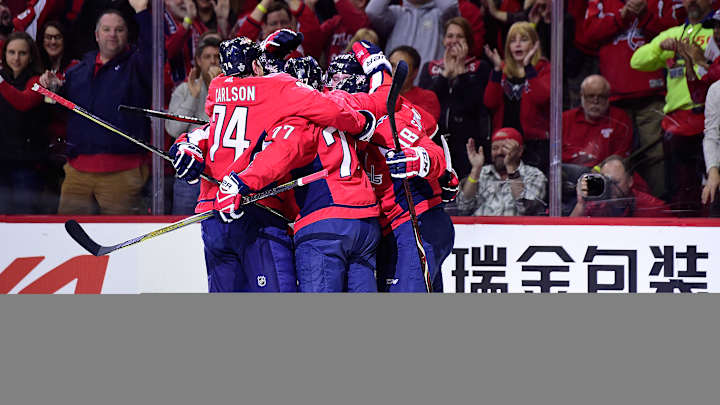Despite an Uninspiring Third Period, Washington Finds a Way to Win Game 5

WASHINGTON, D.C. — Nicklas Backstrom is a cerebral centerman, plodding and patient, for whom even small moves are preceded by thorough calculation. He takes pride in outsmarting opponents as much as outskating them, messing with minds more than bruising bodies. Not that he is especially choosy when forethought is replaced by good fortune, either. “I honestly thought we got a little lucky,” Backstrom said, wearing a gold chain around his neck and a T-shirt colored St. Patrick’s Day green. “But we’ll take it.”
A small shred of normalcy was restored here Saturday afternoon, given that the home team actually held serve for the first time in this funhouse opening-round series. And yet little about the Washington Capitals' 4-3 overtime triumph in Game 5—clinched on Backstrom’s full-extension deflection past Blue Jackets goalie Sergei Bobrovsky—followed typical wisdom. They handed Columbus five power plays and fell behind 1-0 on a shorthanded strike from Matt Calvert in the first period. They finished regulation with a single shot on net in the third, not so much weathering the storm but sleeping straight through it. “It's been I'm sure pretty nerve-wracking for everybody watching,” winger Brett Connolly said. “But we found a way again. We found a way.”
How? No doubt Backstrom factored prominently—and fortuitously, benefiting from a fluky carom over Bobrovsky’s shoulders for a first-period goal before jutting out his stick on defenseman Dmitry Orlov’s point shot in sudden death. So did a stingy penalty kill unit that has now snuffed 13 straight Columbus man advantages, and goalie Braden Holtby, whose 39 saves ensured that Washington avoided approaching the brink of elimination. “I think we’ve always regrouped,” Holtby said. “It shows our confidence and our experience in a lot of areas. We did that again.”
The NHL Penalty Box Is a Small Glass Case Made for Oddities
Instead that burden of desperation falls to Columbus, losers of three straight heading home for Monday’s do-or-die Game 6. “I won’t have to say a damn word to them,” coach John Tortorella said. “We’ll be back here for Game 7.” The confidence is somewhat justified; during an otherwise humdrum first round featuring two sweeps and two other series that wrapped in five games, the Capitals and Blue Jackets have been nail-bitingly close, requiring overtime on four occasions. “Our backs are against the wall, right?” captain Nick Foligno said. “[But] I don’t have any worries at all. If we have the same effort, the same mentality that we did tonight we should be just fine.”
This one ranked somewhere near stucco walls on the ugliness scale, full of blown edges and missed passes. There was the whoops-o-rama backhander from Calvert after he fanned on the initial attempt, hard enough to blow a breeze across the Potomac. His team had penalty issues too with four minors through two periods, including Josh Anderson’s slash that led to a T.J. Oshie deflection goal to give the Capitals a 3-2 lead. Then came their one-shot third period, which amazingly enough did not mark a playoff franchise low but came as close as possible.
Holtby made the difference for those 20 minutes, stopping 15 of 16 shots, caving only when Oliver Bjorkstrand tipped a puck that short-hopped underneath his blocker pad and tied the game at 3-3. “I look at it as the hockey gods giving something back,” coach Barry Trotz said, referring to the 58 shots that the Capitals pelted toward Bobrovsky in Game 3. But more was needed than prayer alone entering overtime. Their breakouts had grown sloppy, their puck battles soft. “They said, let’s get on our toes, let’s go for it,” Trotz said. “That’s what we want to do when we get in the playoffs: go for it.”
The alternate reality would’ve been bleak indeed—more heartbreak for an anxious home crowd, more pressure for a core group still searching for its first conference finals, more questions about what another early summer might bring. Instead there was a celebratory sea of red, smooshing Backstrom so hard that his helmet popped off. A few minutes later, he decamped to the bench and sat beside Ray Ferraro, the former NHL center who was conducting a postgame interview for NBC Sports. Asked about his winning goal, Backstrom all but shrugged. “I thought they played way better,” he said. “That’s how hockey is sometimes.”
